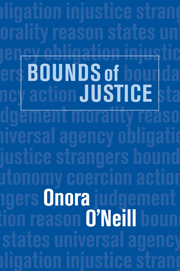Book contents
- Frontmatter
- Contents
- Preface
- Introduction
- Part I Philosophical Bounds of Justice
- Part II Political bounds of justice
- 7 Transnational economic justice
- 8 Justice, gender and international boundaries
- 9 Identities, boundaries and states
- 10 Distant strangers, moral standing and porous boundaries
- Bibliography
- Index
8 - Justice, gender and international boundaries
Published online by Cambridge University Press: 02 December 2009
- Frontmatter
- Contents
- Preface
- Introduction
- Part I Philosophical Bounds of Justice
- Part II Political bounds of justice
- 7 Transnational economic justice
- 8 Justice, gender and international boundaries
- 9 Identities, boundaries and states
- 10 Distant strangers, moral standing and porous boundaries
- Bibliography
- Index
Summary
JUSTICE FOR IMPOVERISHED PROVIDERS
Questions about justice to women and about international justice are often raised in discussions of development. Yet many influential theories of justice have difficulty in handling either topic. I shall first compare some theoretical difficulties that have arisen in these two domains and then sketch an account of justice that may be better suited to handling questions both of gender and of international justice.
I begin by distinguishing abstract from relativized theories of justice. Abstract accounts of justice claim simply to abstract from the particularities of persons and their circumstances. They paint justice as blind to gender and nationality. Its principles are tailored for ‘abstract individuals’, and hence take no account of differences between men and women and transcend international boundaries. Relativized accounts of justice not only acknowledge the variety and differences among humankind but ground principles of justice in the discourse and traditions of actual communities. Since nearly all of these relegate (varying portions of) women's lives to a ‘private’ sphere, within which the political virtue of justice has no place, and see state boundaries as limits of justice, appeals to actual traditions tend both to endorse institutions that exclude women from the ‘public’ sphere, where justice is properly an issue, and to insulate one ‘public’ sphere from another.
Both abstract and relativized accounts of justice look inadequate from the perspective of those whom they marginalize. Women, in particular poor women, will find that neither approach takes account of the reality of carrying both reproductive and productive tasks, while having relatively little control over the circumstances of one's life.
- Type
- Chapter
- Information
- Bounds of Justice , pp. 143 - 167Publisher: Cambridge University PressPrint publication year: 2000
- 3
- Cited by



